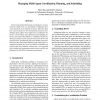Free Online Productivity Tools
i2Speak
i2Symbol
i2OCR
iTex2Img
iWeb2Print
iWeb2Shot
i2Type
iPdf2Split
iPdf2Merge
i2Bopomofo
i2Arabic
i2Style
i2Image
i2PDF
iLatex2Rtf
Sci2ools
133
click to vote
ATAL
2004
Springer
2004
Springer
Managing Multi-Agent Coordination, Planning, and Scheduling
Most research about multi-agent coordination is concentrated at a high level, e.g., developing coordination interaction protocols to be imposed on agents. There has been less concern about how the internal task structures of individual agents affect these higher-level coordination behaviors. In particular, agent planning and scheduling behaviors are inextricably linked to coordination behaviors. This paper proposes some extensions and restrictions to the expressiveness of traditional plan and schedule representations that allow the formal definition of the multi-agent coordination problem. We recast our GPGP coordination approach using this formalism, and present a set of general rules relating task environment characteristics and this implemented set of GPGP coordination mechanisms.
ATAL 2004 | Coordination Behaviors | Coordination Interaction Protocols | Intelligent Agents | Multi-agent Coordination |
Related Content
| Added | 20 Aug 2010 |
| Updated | 20 Aug 2010 |
| Type | Conference |
| Year | 2004 |
| Where | ATAL |
| Authors | Wei Chen, Keith Decker |
Comments (0)

